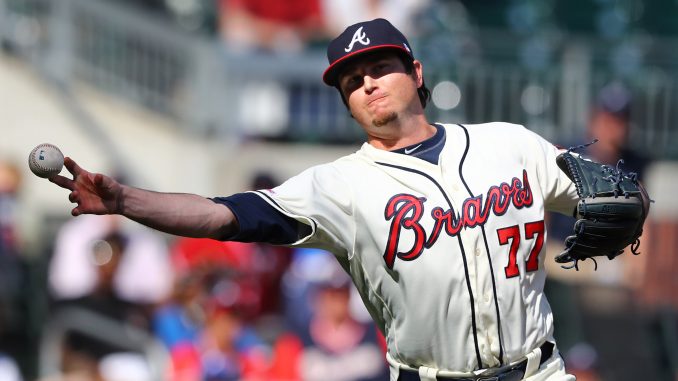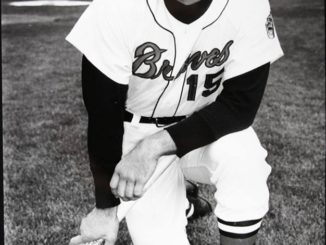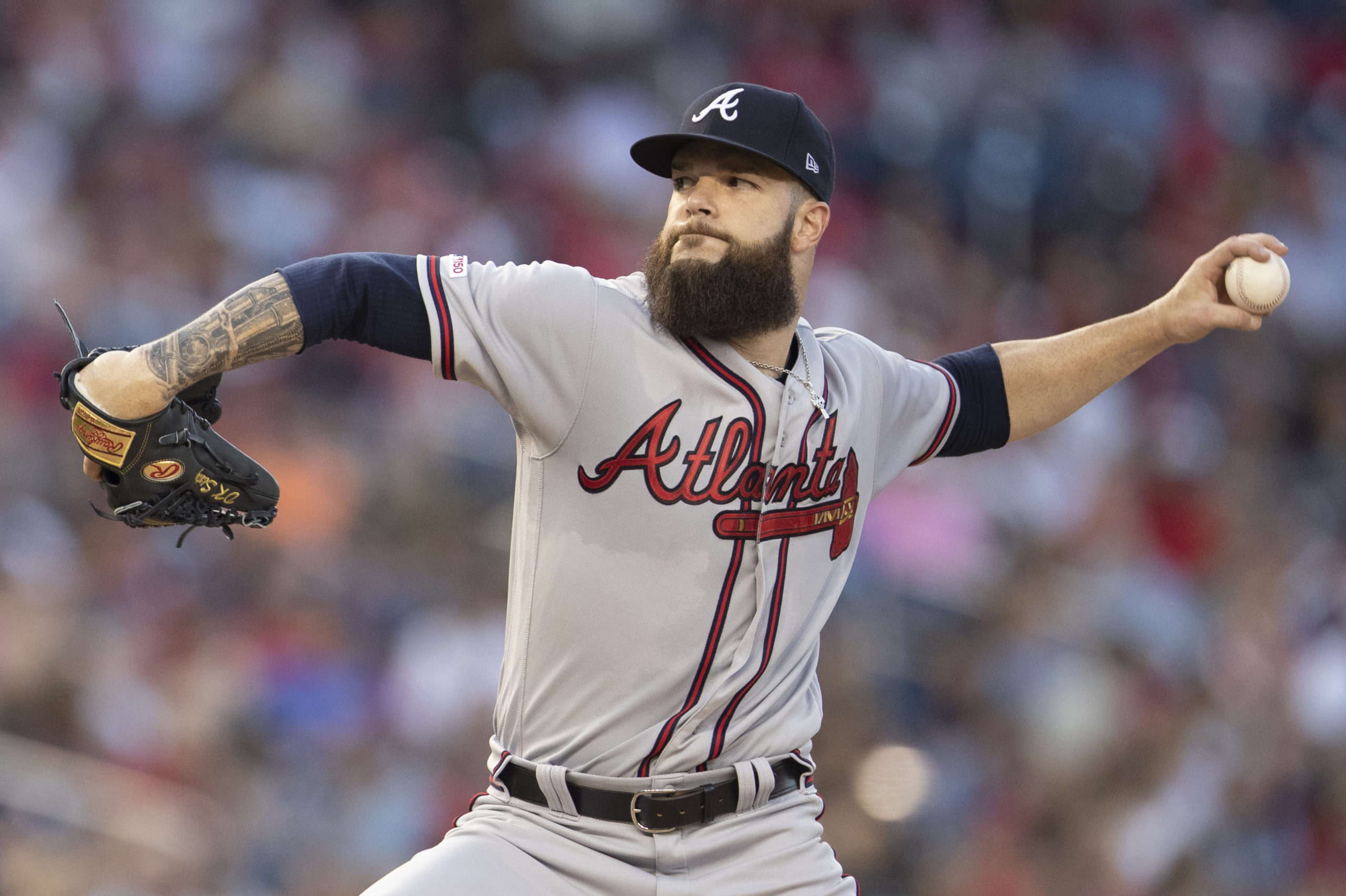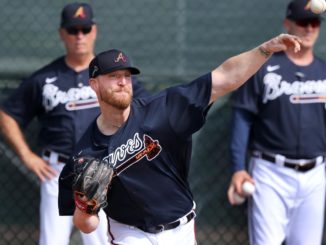
See also: Best Brave By Uniform Number Index
(Editor’s note: Outfield Fly Rule is delighted to publish this guest article by Alex Butler, co-host of the Chatting Average Podcast and known to Braves fans on twitter as @RileysRakes.)
The best Brave to wear #77 is current right-handed reliever and member of the “Night Shift”, Luke Jackson.
If you hear that, and you’re an Atlanta Braves fan, surely a very strong opinion pops into your head. Rarely in my time as a Braves fan have I seen a player quite as polarizing as Jackson. It seems as though everyone I speak to about him either wants to build a statue of the guy outside of Truist Park or wants him to be banished to a Scandinavian league team for the remainder of his career. Being famously amongst the group that hold him on a pedestal, at least in the world of Twitter, I am honored to be the one to tell his story for Outfield Fly Rule.
Luke Jackson, Texas Ranger
Jackson excelled in his senior season in high school, posting an 8-1 record and a 0.90 ERA for Calvary Christian Academy in Fort Lauderdale, FL. Despite having committed to play at the University of Miami, Jackson was drafted by the Texas Rangers with the 45th pick in the first round of the 2010 MLB Draft, and ultimately chose to forego college to begin his professional career.
Jackson had a tough first few seasons in the minor leagues, going 5-6 with a 5.64 ERA in 2011 for the Low-A Hickory Crawdads, but showed some improvement the following season, going 10-7 with a 4.65 ERA, which earned him a promotion to the High-A Myrtle Beach Pelicans. The 2013 season was when things really began to click for Jackson. He began the season back in Myrtle Beach, and after beginning the year 9-4 with a 2.41 ERA, found himself again promoted, this time to the AA Frisco RoughRiders, where he went 2-0 in 6 appearances along with a 0.67 ERA. This was enough to win him the Nolan Ryan Minor League Pitcher of the Year award which is awarded to the best minor league pitcher in the Texas system, and he began his true ascent towards the big leagues.
By the time 2015 rolled around, Jackson was spending the season with the AAA Round Rock Express, and by August of that year, was making his MLB debut for the Texas Rangers. It wouldn’t be long before the Atlanta Braves came calling. On December 8, 2016, the Texas Rangers traded Luke Jackson to the Atlanta Braves in exchange for Tyrell Jenkins and Brady Feigl. You may remember the name Tyrell Jenkins because he was the smaller piece of the Shelby Miller trade that saw Atlanta send Jason Heyward to St. Louis, signaling the beginning of a massive rebuild for the Braves two years prior to the acquisition of Luke Jackson.
Struggles With Atlanta
Now at the time, it seemed like that was a high price to pay for an unproven young pitcher with no real big-league body of work to reference, and to further frustrate Braves fans, Jackson spent much of the period between 2016 and 2018 bouncing around the Braves system, a stretch that saw him both demoted and designated for assignment on multiple occasions, but also eating up 91.1 innings for the Braves, and getting some valuable major league experience. The third time Jackson was designated for assignment, in June 2018, Jackson began to lose confidence that he would be able to have another opportunity with Atlanta and decided to become a free agent rather than accept assignment. General manager Alex Anthopoulos made a personal phone call to Jackson the same day asking him to sign back with the club; while the Braves had been in a roster crunch that made Jackson’s designation necessary, the team still believed in him and more importantly in his newly re-vamped slider he had been working on in AAA Gwinnett. Jackson agreed to a major league contract and re-joined Atlanta on June 17 and has been in the big leagues ever since.
Luke Jackson, at least the version that most Braves fans are familiar with, has always had great stuff. His fastball sits in the mid to high 90s, but it has been the development of his high spin-rate slider that has kept him in the majors. The issue was maintaining control and limiting damage, and Jackson, thankfully, was given ample time to correct those issues. But it wasn’t until 2019, nine years after he was initially drafted, that Jackson really became a fixture in the Braves bullpen.
Jackson had a good year in 2019, his first while wearing #77 with Atlanta, posting a 3.84 ERA in 72.2 innings pitched, and even notching 18 saves as he found himself thrust into the closer’s role early in the season after injuries and uneven performances from Arodys Vizcaino and A.J. Minter. Being in this role put him under intense scrutiny from the Braves fanbase, as it was a role he wasn’t quite ready for at that time. Jackson had a bad habit of allowing some runners to reach base before finding his stuff and getting out of jams, a pattern that many fans dubbed “The Luke Jackson Experience” as it became a regular occurrence for him to make fans very nervous before eventually making everything ok.
The 2020 season was an odd season for everyone. Spring Training was cut short and there was a long delay before the season could begin due to COVID-19. This took its toll on Jackson as much if not more than anyone else on the roster. The shortened season and lack of preparation played into Jackson posting his worst season in the majors to date, a season that ended with him having a 6.84 ERA over 21.1 innings pitched. Braves fans nationwide were beginning to give up on him, and things looked to be spiraling downwards.
Then came 2021.
The Night Shift
Before we get into Jackson’s performance in 2021, let’s take a quick look at why the Braves thought highly enough of him to keep him on board after a dismal 2020 campaign. His fastball was dominant and his slider was once again a pitch that could make even the greatest of major league hitters look silly. The year 2021 began with Luke Jackson essentially filling a middle relief role with very little in the way of expectations, which was a situation that allowed him to regain his confidence and again pitch like the player who had shown so much promise in 2019.
The 2021 season is obviously still fresh in everyone’s mind. How could it not be? It was the single greatest season of baseball ever in the adult lives of the majority of Braves fans. Let’s make sure we don’t forget the impact that Luke Jackson had on this season. All Jackson did was post a 1.98 ERA across 63.2 innings of relief work, solidifying his role as a 7th or 8th inning reliever and part of the “Night Shift” bullpen that ended up securing the Braves’ first world title in 26 years.
So call Luke Jackson what you want, be it “The Luke Jackson Experience”, “Your Friendly Neighborhood Slider-Man”, or my personal favorite “ELITE”, but you will forever know this man as a World Champion.
Honorable Mention
Rico Carty wore #77 as a rookie with the Milwaukee Braves and hit .328/.387/.551, but switched to #43 for the final 8 seasons of his Braves career before being traded to Texas.
Carty is the only Brave to wear #77 in a regular season game besides Luke Jackson.
Who Is the Best Ever To Wear #77?
While there has been two Hall of Famers to wear #77 (Joe Medwick for the 1940-41 Dodgers and Ivan Rodriguez for the 2009 Houston Astros), neither wore the number for very long or are really known for the number. Most players who wear #77 tend to be players who are transitioning into the league and switch to a lower number at a later date, or players traded to a team mid-season where their preferred #7 is already taken.
So for now we’ll go with right-hander Ben Weber, who wore the number for five seasons with the Anaheim Angels and Cincinnati Reds from 2001-05, compiling a 3.55 ERA in 209 appearances as #77 and a 3.77 ERA overall.
One more season like 2021, and Luke Jackson could probably claim the title of best #77 of all time.




Leave a Reply